Abstract
Children's consent to treatment remains a contentious topic, with confusing legal precepts and advice. This paper proposes that informed consent in children should be regarded as shared between children and their families, the balance being determined by implicit, developmentally based negotiations between child and parent--a "family rule" for consent. Consistent, operationalized procedures for ethically obtaining consent can be derived from its application to both routine and contentious situations. Therefore, use of the "family Rule" concept can consistently define negligent procedure in obtaining consent from children, and could be used as a unifying framework in the development of new professional guidelines. A "guideline"-based approach to children's consent to treatment may offer greater individuality than a "rights"-based approach, though careful training and oversight will be needed for it to be effective.
Full text
PDF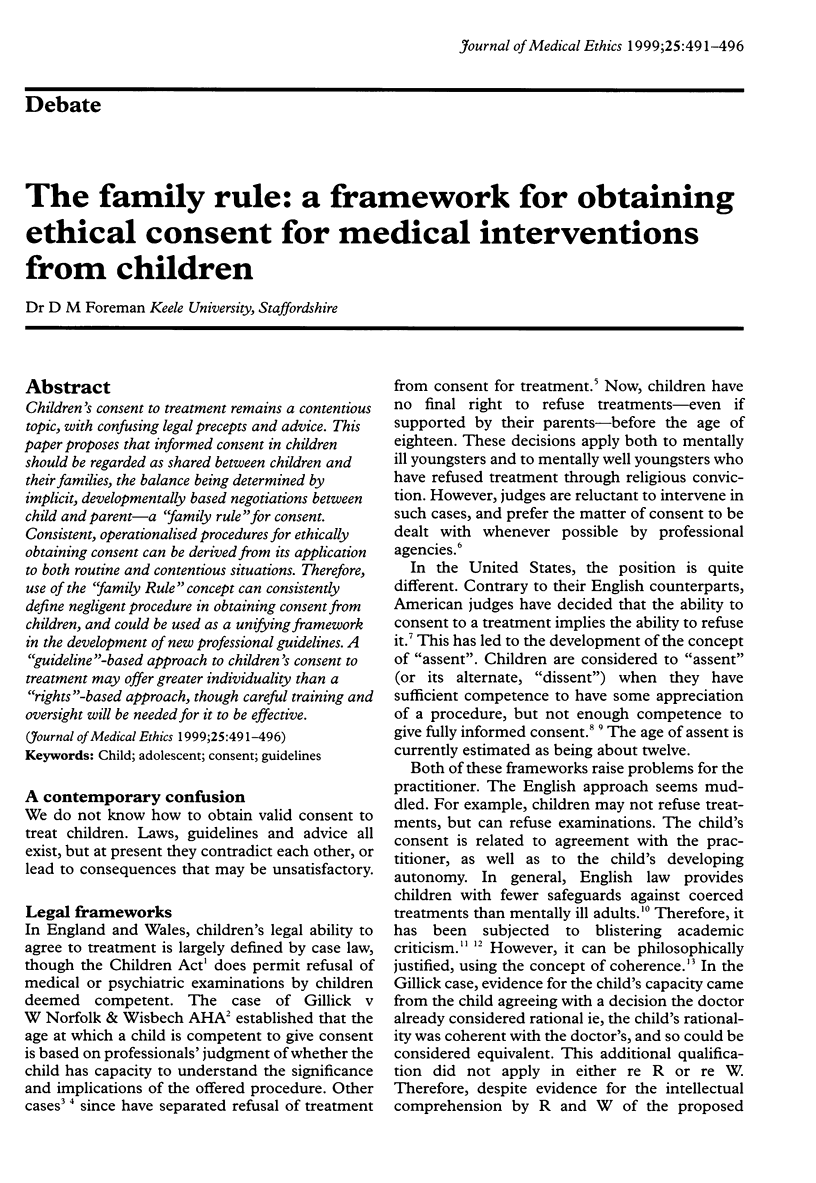
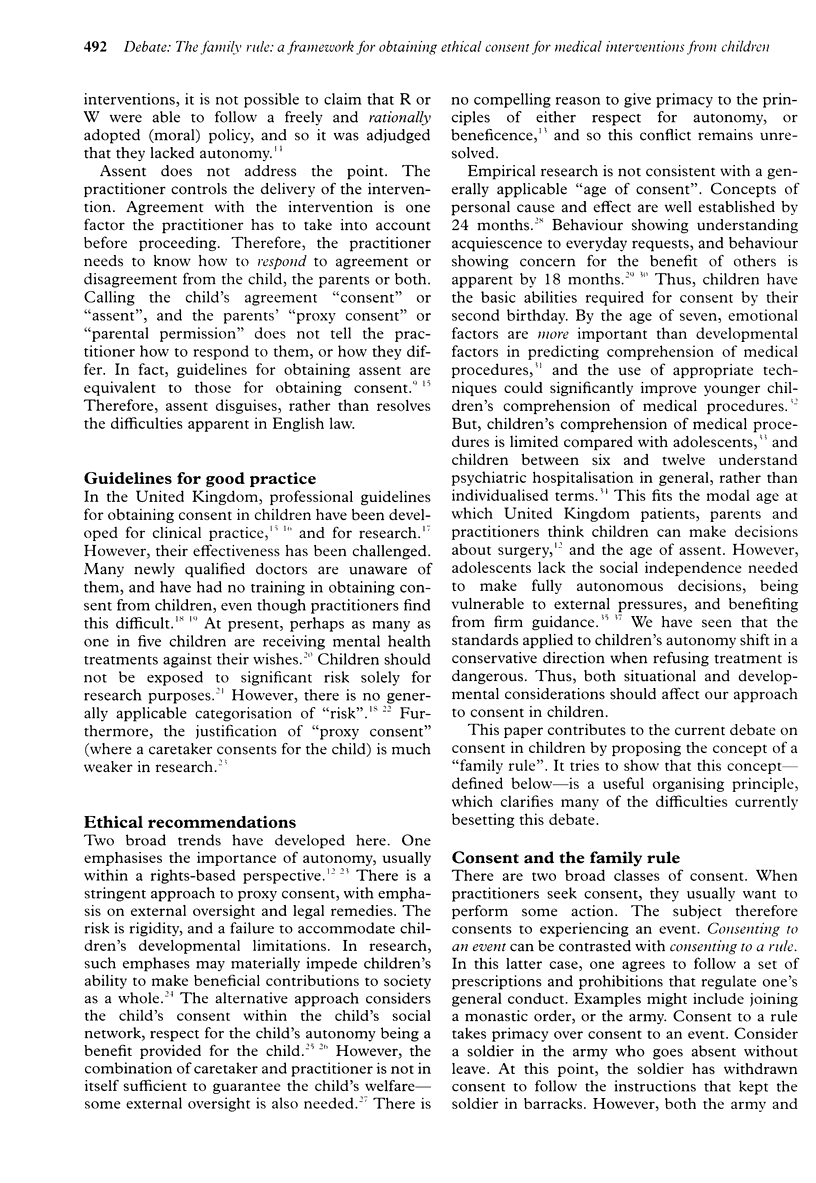
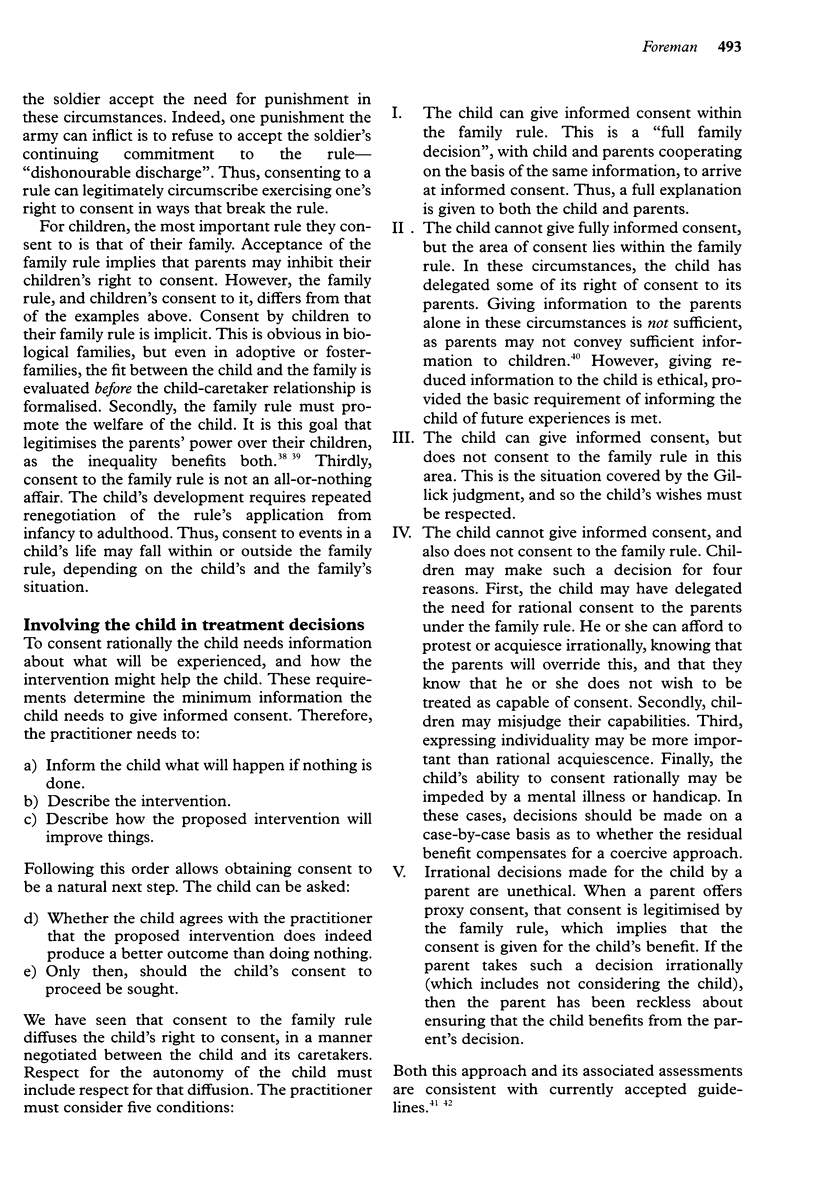
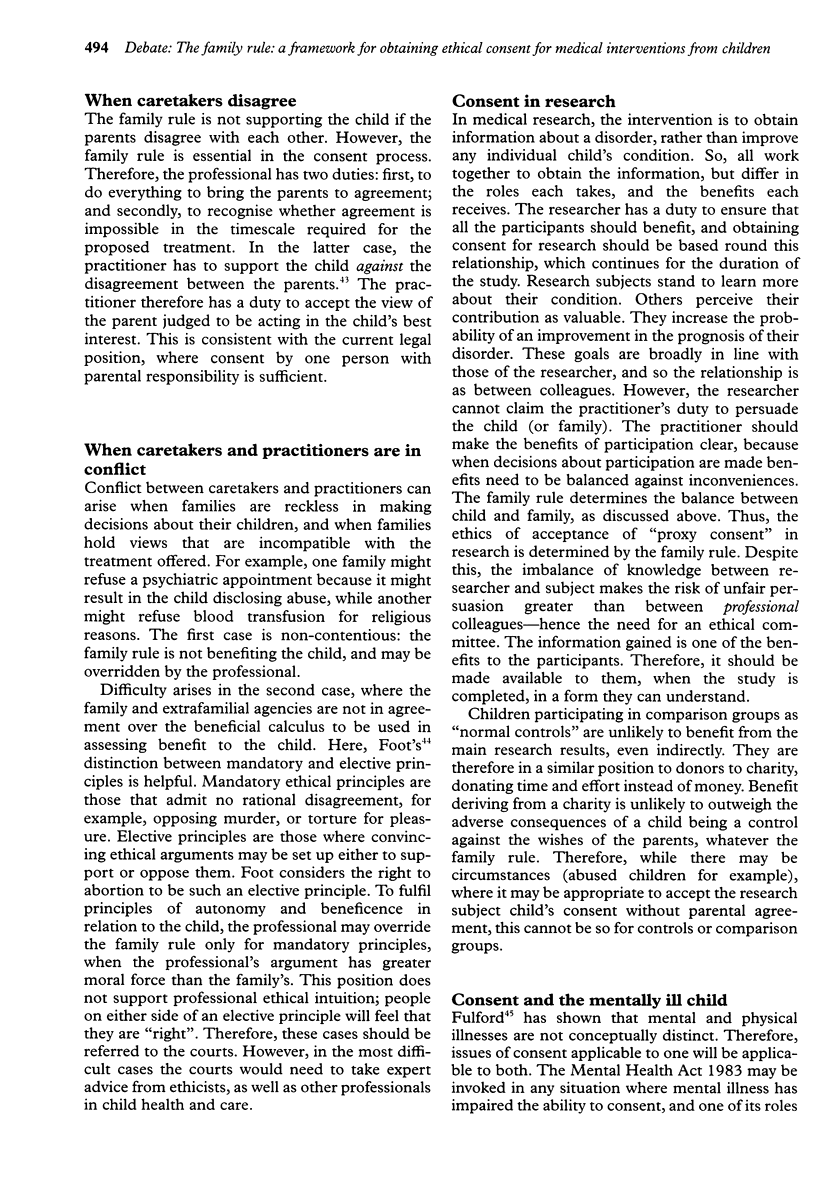
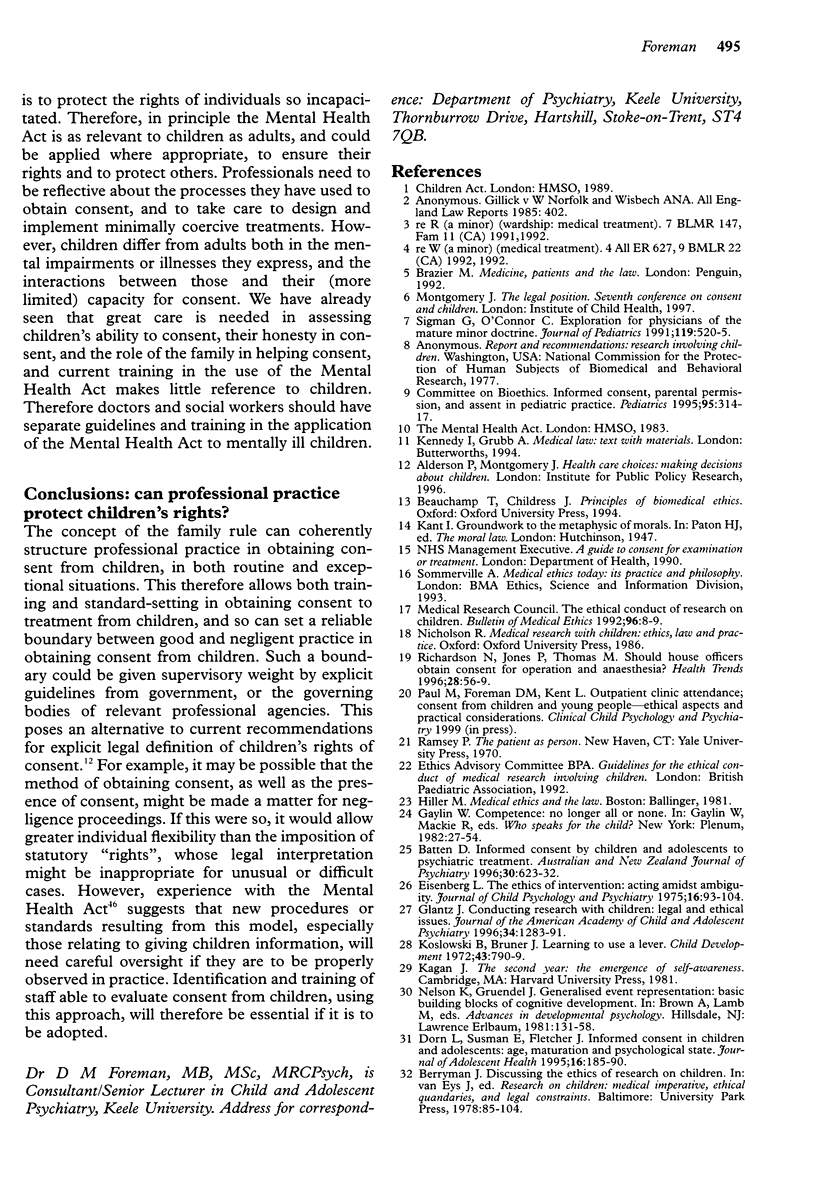
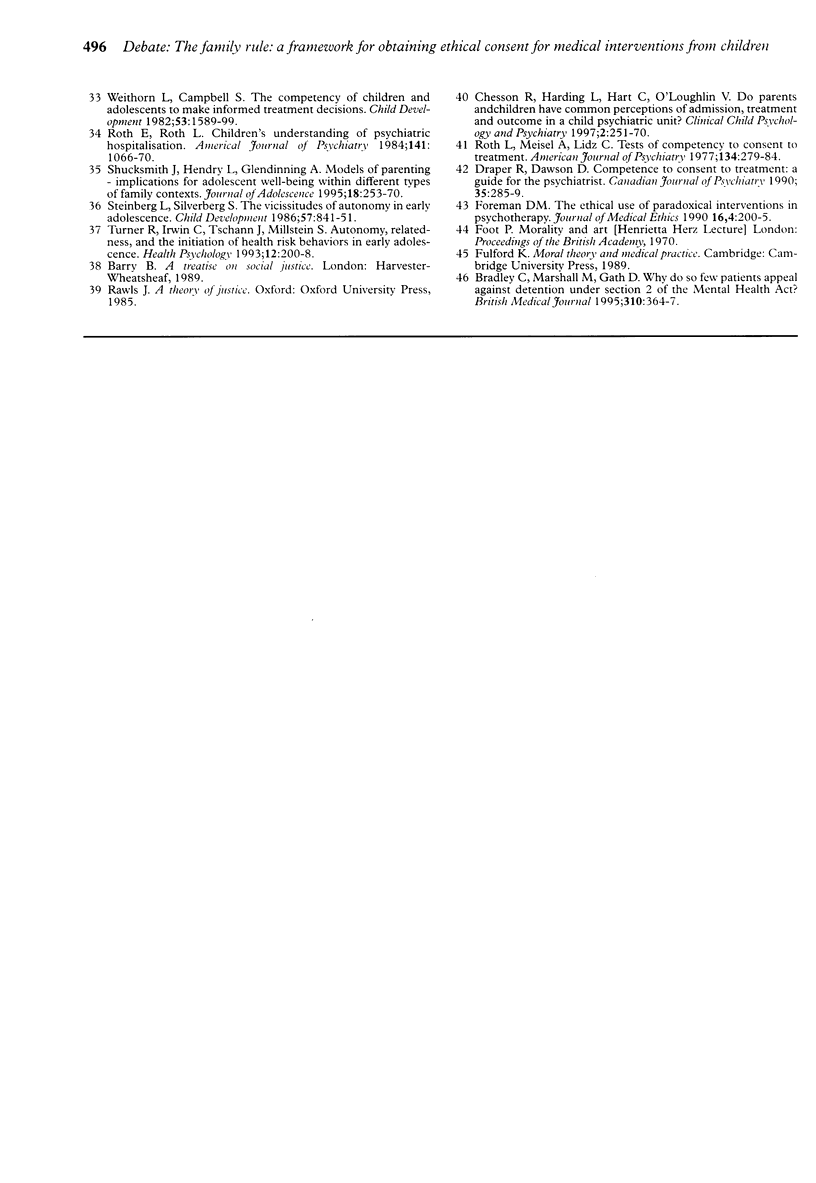
Selected References
These references are in PubMed. This may not be the complete list of references from this article.
- Batten D. A. Informed consent by children and adolescents to psychiatric treatment. Aust N Z J Psychiatry. 1996 Oct;30(5):623–632. doi: 10.3109/00048679609062657. [DOI] [PubMed] [Google Scholar]
- Bradley C., Marshall M., Gath D. Why do so few patients appeal against detention under Section 2 of the Mental Health Act? BMJ. 1995 Feb 11;310(6976):364–367. doi: 10.1136/bmj.310.6976.364. [DOI] [PMC free article] [PubMed] [Google Scholar]
- Dorn L. D., Susman E. J., Fletcher J. C. Informed consent in children and adolescents: age, maturation and psychological state. J Adolesc Health. 1995 Mar;16(3):185–190. doi: 10.1016/1054-139X(94)00063-K. [DOI] [PubMed] [Google Scholar]
- Draper R. J., Dawson D. Competence to consent to treatment: a guide for the psychiatrist. Can J Psychiatry. 1990 May;35(4):285–289. doi: 10.1177/070674379003500401. [DOI] [PubMed] [Google Scholar]
- Eisenberg L. The ethics of intervention: Acting amidst ambiguity. J Child Psychol Psychiatry. 1975 Apr;16(2):93–104. doi: 10.1111/j.1469-7610.1975.tb01260.x. [DOI] [PubMed] [Google Scholar]
- Foreman D. M. The ethical use of paradoxical interventions in psychotherapy. J Med Ethics. 1990 Dec;16(4):200–205. doi: 10.1136/jme.16.4.200. [DOI] [PMC free article] [PubMed] [Google Scholar]
- Glantz L. H. Conducting research with children: legal and ethical issues. J Am Acad Child Adolesc Psychiatry. 1996 Oct;35(10):1283–1291. doi: 10.1097/00004583-199610000-00015. [DOI] [PubMed] [Google Scholar]
- Johnson T. A., Press O. W. Synergistic cytotoxicity of iodine-131-anti-CD20 monoclonal antibodies and chemotherapy for treatment of B-cell lymphomas. Int J Cancer. 2000 Jan 1;85(1):104–112. doi: 10.1002/(sici)1097-0215(20000101)85:1<104::aid-ijc19>3.0.co;2-g. [DOI] [PubMed] [Google Scholar]
- Koslowski B., Bruner J. S. Learning to use a lever. Child Dev. 1972 Sep;43(3):790–799. [PubMed] [Google Scholar]
- Roth E. A., Roth L. H. Children's understanding of psychiatric hospitalization. Am J Psychiatry. 1984 Sep;141(9):1066–1070. doi: 10.1176/ajp.141.9.1066. [DOI] [PubMed] [Google Scholar]
- Roth L. H., Meisel A., Lidz C. W. Tests of competency to consent to treatment. Am J Psychiatry. 1977 Mar;134(3):279–284. doi: 10.1176/ajp.134.3.279. [DOI] [PubMed] [Google Scholar]
- Sigman G. S., O'Connor C. Exploration for physicians of the mature minor doctrine. J Pediatr. 1991 Oct;119(4):520–525. doi: 10.1016/s0022-3476(05)82398-4. [DOI] [PubMed] [Google Scholar]
- Steinberg L., Silverberg S. B. The vicissitudes of autonomy in early adolescence. Child Dev. 1986 Aug;57(4):841–851. doi: 10.1111/j.1467-8624.1986.tb00250.x. [DOI] [PubMed] [Google Scholar]
- Turner R. A., Irwin C. E., Jr, Tschann J. M., Millstein S. G. Autonomy, relatedness, and the initiation of health risk behaviors in early adolescence. Health Psychol. 1993 May;12(3):200–208. doi: 10.1037//0278-6133.12.3.200. [DOI] [PubMed] [Google Scholar]
- Weithorn L. A., Campbell S. B. The competency of children and adolescents to make informed treatment decisions. Child Dev. 1982 Dec;53(6):1589–1598. [PubMed] [Google Scholar]


